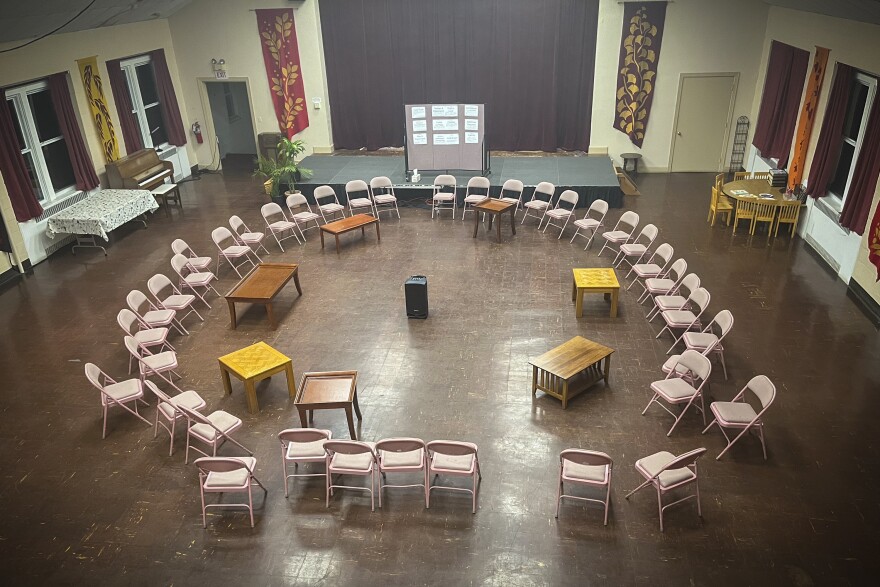We reported earlier this year on a proposed ceasefire resolution in Hamden aimed at ending the war between Israel and Hamas in Gaza. That proposal stirred a lot of controversy.
It also led to a series of community dialogues facilitated by Pastor Jack Perkins Davidson from Spring Glen Church in Hamden. Now, the group is releasing a document summarizing these conversations. It’s titled “A Communal Expression of Empathy.”
Perkins Davidson recently spoke on Morning Edition.
On how the idea for these community dialogues come about
During a six-hour marathon of public input on the ceasefire resolution, I was really struck by a number of things, but particularly the way that when people shared real, authentic experiences of trauma and bigotry, they were received by some in the audience who shouted, “lies!” or liar!”
The inhumanity of that, and the disconnect it represented, felt like such an important thing to address.
When a Palestinian American teenager said he lost 36 members of his family, and that's received with “lies!” or a Jewish member of the community shared experiences of antisemitism in the schools, and that was received with “lies!” It felt like we needed a space to come together as a community and really connect and humanize and empathize with each other.

On setting up some of the first community dialogues
At that initial public input session, a couple of the rabbis in the community, particularly Rabbi Benjamin Scolnic from Temple Beth Sholom, put out a call to the community that he was willing to talk to anyone about this topic.
One of my interfaith partners reached out to me and said, “We have to take him up on this.” And so if he was willing to organize the logistics, I said I was willing to host. And we gathered together a small group of people in the first session, community leaders, Rabbi Scolnic, along with Rabbi Dennis Ross, who was the interim at Congregation Mishkan Israel at the time, as well as representatives Abdul Osmanu and Laurie Sweet from the town council, to dig into what it was that created these tensions and where the hurt was and how we could move forward.
On meeting participation
We have strived for balanced representation on multiple scales of identity. Part of the reason we created these community conversations was to undermine that binary – pro-Israel, pro-Palestine.
A number of the participants said they felt a tension or an isolation in, you know, being a pro-ceasefire person in their Jewish family or Jewish community, while also being pro-Israel in their activist community – and trying to balance those two identities and those two relational connections.

We also found that a lot of people who were pro-Israel and even pro-ceasefire were anti-resolution. And so there was this really diverse and nuanced gathering of people. The predominant participation was of Jewish community members, but again, that was through a broad swath of opinions and viewpoints.
On what’s inside “A Communal Expression of Empathy”
Our goal was really to create space where we could hold our differences in tension, but also name some commonalities and focus the discussion.
There are three sections in this. One, was to name the division within our shared grief, and I think that's an important piece, shared grief. I heard a lot of trauma experienced on all sides of the room.
Secondly, to name common themes underneath the division. So even in the points where we vehemently disagreed with each other, there were fascinatingly common themes connecting across the proverbial aisles.
Lastly, we wanted to name some shared values that we do have. The document ends with a list of eight points that we all agreed on.
On breakthroughs that have emerged from these conversations
I think people who previously viewed each other as a threat, were able to connect on a human level, both to hear each other out, and even though they have no agreement necessarily on the details of this topic, they were also able to connect as humans about their love of gardening and their favorite restaurants and their other neighborly connections.
Also, many of us realized how disconnected our bubbles are in the world, that the difficulty of getting certain demographics into the room, how hard it was. We struggled to get Muslim participants and Palestinian participants in some ways, because it is such a risk for them and such an exhausting process for them, and also struggled to get some Jewish and Israeli voices in the room as well for the same reason.
Learn more:
The document, “A Communal Expression of Empathy,” is available to read online.
The following transcript has been edited and condensed for clarity.





